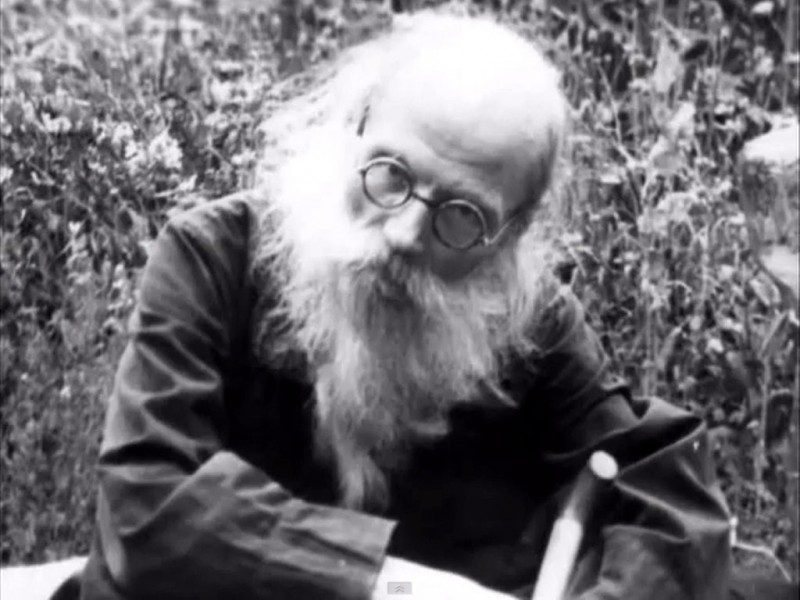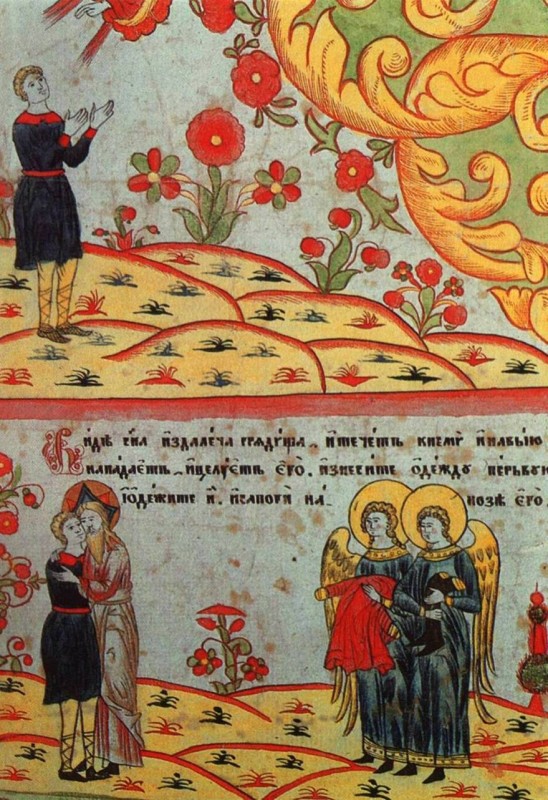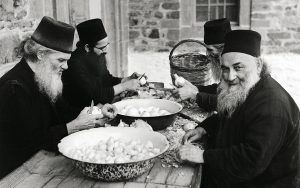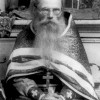And He said, A certain man had two sons: And the younger of them said to his father, Father, give me the portion of goods that falleth to me. And he divided unto them his living. And not many days after the younger son gathered all together, and took his journey into a far country, and there wasted his substance with riotous living. And when he had spent all, there arose a mighty famine in that land; and he began to be in want. And he went and joined himself to a citizen of that country; and he sent him into his fields to feed swine. And he would fain have filled his belly with the husks that the swine did eat: and no man gave unto him. And when he came to himself, he said, How many hired servants of my father’s have bread enough and to spare, and I perish with hunger! I will arise and go to my father, and will say unto him, Father, I have sinned against heaven, and before thee, And am no more worthy to be called thy son: make me as one of thy hired servants. And he arose, and came to his father. But when he was yet a great way off, his father saw him, and had compassion, and ran, and fell on his neck, and kissed him. And the son said unto him, Father, I have sinned against heaven, and in thy sight, and am no more worthy to be called thy son. But the father said to his servants, Bring forth the best robe, and put it on him; and put a ring on his hand, and shoes on his feet: And bring hither the fatted calf, and kill it; and let us eat, and be merry: For this my son was dead, and is alive again; he was lost, and is found. And they began to be merry. Now his elder son was in the field: and as he came and drew nigh to the house, he heard music and dancing. And he called one of the servants, and asked what these things meant. And he said unto him, Thy brother is come; and thy father hath killed the fatted calf, because he hath received him safe and sound. And he was angry, and would not go in: therefore came his father out, and intreated him. And he answering said to his father, Lo, these many years do I serve thee, neither transgressed I at any time thy commandment: and yet thou never gavest me a kid, that I might make merry with my friends: But as soon as this thy son was come, which hath devoured thy living with harlots, thou has killed for him the fatted calf. And he said unto him, Son, thou art ever with me, and all that I have is thine. It was meet that we should make merry, and be glad: for this thy brother was dead, and is alive again; and was lost, and is found (Luke 15:11-32).
 In the Name of the Father, and of the Son, and of the Holy Spirit!
In the Name of the Father, and of the Son, and of the Holy Spirit!
The Holy Church gradually prepares the faithful for the days of repentance and cleansing of sins, the days of Great Lent. Last Sunday you heard the parable of the Publican and the Pharisee, in which the Lord showed us how to repent and entreat the Lord for the forgiveness of sins. Now we hear the Savior’s parable about the prodigal son, about how the Lord accepts even a great sinner if the latter bears heartfelt contrition for his sins. The Lord spoke this parable: A certain man had two sons. Now the younger of these sons asks the father to give him his portion of the inheritance. The father did not refuse; he gave him his portion of the inheritance. After some time, this son took all his goods and went into a “far country,” where he wasted everything in prodigal living.
The rich man is the Lord. Of the two sons, the elder son is the angelic world and the younger son is all of humanity and every one of us. What took place with the younger son, that is, with humanity? Following creation, Adam and Eve were in paradise with their Creator, God the Father, and the angels. But they transgressed, fell away from the Lord, and withdrew to a “far country” in which they squandered all their spiritual riches of mind, heart, and faith – they distorted everything. Every one of us has become like Adam and Eve.
Every person possesses the image of God; every person receives the greatest grace, God’s great gifts, at the Mystery of Baptism. But starting from childhood, from infancy, we begin to squander God’s goods, receding ever further from God by our sins into a “far country.” What is this “far country”? It is a spiritual condition in which the soul is entirely full of such thoughts, feelings, impulses, words, and deeds as are characteristic of the devil alone and separate us from the Lord. And the graver the sins, and the more of them there are, the further man becomes separated from God. Thus has all mankind become separated; thus is each one of us separated from the Heavenly Father.
But when the prodigal son of the Gospel recognized his spiritual poverty, understanding that he was lost and in terrible condition, close to ultimate perdition, he “came to himself,” as the Lord said. He remembered how many of his father’s hired servants have everything they desired, while here he was perishing from spiritual hunger. He told himself that he would arise, go to his father, and tell him: “Father, I am unworthy to be called your son, but accept me even as one of your hired servants.”
With these thoughts he arose and went to his father. While he is still afar off, his father, like the All-Seeing God, already knows his contrition; he goes out to meet him, falling on his neck and kissing him. He pays no attention to the words of his son, who says: I am no more worthy to be called thy son. He gives his servants orders to bring his son the best clothes, to put a ring on his hand, to put shoes on his feet, and to kill the fatted calf that they might rejoice and be glad, for this son was dead, and is alive again; he was lost, and is found. The father gave a feast and all rejoiced at the son’s return. The Lord’s words find clear expression in this parable: Joy shall be in heaven over one sinner that repenteth (Luke 15:7).
Whose heart is not moved by the love of the father who, seeing from afar his prodigal son who had squandered everything and exhausted all his spiritual and bodily strength, runs out to meet him, falls on his neck, kisses him, and restores him to his original dignity – the dignity not of a hired servant, as the son had asked, but of his own son? We also know love greater than that of which this parable speaks: we know the unfathomable and ineffable love, impenetrable to the understanding not only of men but even of angels, of the Merciful God for the fallen human race and each one of us.
We know that the Heavenly Father, in pre-eternal council with His Only-Begotten Son and the Holy Spirit, decided to send to earth, to a “far country,” His Only-Begotten Son, the Lord Jesus Christ. The Lord Himself went to this “far country,” leaving heaven and living like a simple man. He passed through all the ages of man without sin, subject to all manner of abuse and persecution. The Pharisees blasphemed against even His obvious miracles; people said He was possessed, a sorcerer, and in league with the devil. He was insulted, persecuted, and finally spat upon, beaten, and crucified on the Cross. All this was endured by the Son of God, the Only-Begotten of the Father and Creator of the world, the Lord Who came to save the fallen sinner.
Such is the love that the Lord has shown us. How callous must the human heart be not to respond to God’s love, to remain consciously in sin, in that “far country” in which the Lord is insulted by the violation of His commandments and by the rejection and denial of Him?
How hardened must the heart be not to become softened and turn to the Lord when it sees His immeasurable love, unfathomable even to the angels, for the mankind that has fallen into uncleanness and plunged itself into all vice? Even the loftiest Angels, Cherubim, and Seraphim could not understand God’s mercy for man, who had fallen away from Him. They could not understand how the Lord Himself takes on man’s soul and body; how the Lord, the Creator of the world, allows Himself to be offended in order to save His offending human race. The Lord Himself knew that very few would believe in Him and that the majority would reject, insult, and deny Him. And yet, despite all this, the Lord came into the world to save the human race. By His Divine Blood he cleanses the sins of everyone who believes in Him and turns to Him in repentance like the prodigal son. Such is the love that the Lord has shown to man!
The Lord calls out to us all: “Come unto Me, all who labor and are burdened by sin, who are deformed in soul and body! Come, and I will heal you; I will give you rest in the Kingdom of the Heavenly Father, where you will shine like the sun in unspeakable joy! Come!”
Will we really reject the Word of God? Will we, too, really remain among those who reject the Lord, who deny and offend Him in words and deeds, who prefer to live in a “far country” and perish there?
Everyone has the ability to return to the Heavenly Father, just as the prodigal son returned. What is needed for this? In the parable it is said that the prodigal son came to himself, that is, that he understood his fall. He understood the terrible condition he was in; he understood that this condition was not yet everything, that a greater and worse end awaited him: eternal torment after death. In order to escape these torments, every person must come to himself; he must examine his life: not only his deeds and words, but all his thoughts and desires, every movement of his soul, from great to small. He must judge himself, understand his disastrous moral condition, turn his face towards the Lord, and begin to implore the Lord to forgive his offenses, that He might come out to meet them, as He came out to meet the prodigal son; that He might help him to see and feel the burden of his sins, granting him true, sincere, and heartfelt repentance; and that He might put a ring on his finger as a sign of the return of his dignity, making him His child.
Indeed, of this we are unworthy. We must implore the Lord: “Lord, we are unworthy of being called Thy children, but number us at least among the hired servants of the eleventh hour!” Now the Holy Church assures us, in the words of the Lord Himself, that if man will recognize his sins and weep before the Lord for his perdition, and if he will implore the Lord, as did the publican while beating his chest: God be merciful to me a sinner, that the Heavenly Father will never reject him. He will come out to meet him, embrace him, clothe him in the radiant robe of purity, call him His own son rather than a hired servant, and give a feast, an eternal feast in His Kingdom. One has to be spiritually dead in order to pass by the love of God, in order not to take pity on oneself and make a small effort of repentance to receive forgiveness and return to the love of the Father, Who is always ready to call us His sons. Amen.
Translated from the Russian



















